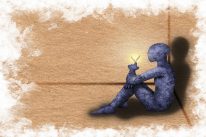
“Wisdom is merely the movement from fighting life to embracing it.” ~Rasheed Ogunlaru
There were many things I wasn’t prepared for when it came to baby raising: the constant self-doubt, the vocal opinions of others, teething that never ended. But the real shock was when my ten-month-old daughter rejected me.
It is human nature to avoid rejection. Nothing is more painful than trying your best or giving your heart and being told it’s not good enough or unwanted. In my case, I went beyond avoiding rejection—I denied the possibility of its existence.
My childhood experiences led me to believe that rejection was the most painful outcome of any situation.
My biological father won custody when my parents divorced and told me that my mother didn’t love me. At the same time, his alcoholism and own painful childhood didn’t allow him to love me unconditionally.
My fear of rejection was so profound that fleeing the mere possibility defined every aspect of my life.
In my twenties I changed friends, jobs, and cities with the frequency of oil changes. I lived in eleven apartments in six cities on both coasts, I had three different careers, and I spent most of the decade single.
If I perceived that someone didn’t reciprocate my feelings, romantically or platonically, I would walk away. If work required that I move beyond my comfort zone or take risks, I would quit. I was out spoken and passionate, but unwilling to be vulnerable to the possibility of rejection.
My fear kept me small. I lived a mediocre life. Avoiding rejection started to suffocate me.
In my thirties, I found the courage to love and to declare myself a writer—two prospects that ensure constant rejection. It was worth it. I was confident that I was healed, until my daughter rejected me.
My sister-in-law comes to our house and watches my daughter two or three times a week; I remain in my home office but am unavailable.
Recently, when my sister-in-law tried to hand me my daughter she began to cry and didn’t stop until her aunt took her back. I was devastated.
She was doing to me what I had promised to never do to her. I expected this from a teenager, not my ten-month-old daughter. Not the infant that I had delivered without a single drug, nursed, made sure never had diaper rash, prepared all her food, smiled, loved, and cuddled.
This may seem like a small and insignificant event, but it opened a deep wound of pain and sorrow. The rejection felt like walking through high school in my underwear, having my boss humiliate me in front of the entire office staff, and being audited by the IRS—simultaneously. It was horrible.
I immediately wanted to withdrawal and cut myself off from the pain. Only this time, I couldn’t; a rejection had finally happened with the one person I couldn’t walk away from—my daughter.
Here is what I learned:
1. Feel the pain.
Do you feel rejected? Do nothing that distracts from the pain. Accept what you feel, exactly as it is.
In moments that I can’t physically escape, I turn to food. The day I felt rejected by my daughter I ate half a bag of chocolate chips and shifted the pain of my heart to my belly. After the bellyache was gone I was left with the pain (and the guilt of overeating).
For you the temptation may be something else: social media, sex, drugs, exercise, work—anything that moves the ache from your heart to somewhere else. Any one of these things can be healthy and enjoyable, but not at the moment you feel rejected.
In this moment, allow yourself to feel the pain of rejection.
2. Know that rejection is not about your worth.
My terror of rejection stemmed from my inability to accept how it made me feel. I would immediately judge my inadequacy and enter into despair. When it happened with my daughter my first thought was that she didn’t love me and I was a failure as a mother.
Feeling the pain does not mean that you affirm your worst self-assessments.
When you feel rejected, do you do what I do and tell yourself that you weren’t enough: kind, smart, pretty, funny (enough)? Do you review every potential error you made along the way and wonder what you should have done differently? Stop.
You will never be beautiful enough, smart enough, kind enough, funny enough, to avoid rejection, because rejection is inevitable. Everyone gets rejected from time to time. And even if you believe you did something that led to the rejection, the issue would be that specific action, not your intrinsic worth.
Rejection isn’t about who you are as a person. There is nothing harder to believe and nothing more important.
3. Challenge your interpretation.
If you allow yourself to feel pain and don’t spiral into self-criticism, you will be more open to alternative possibilities: maybe it wasn’t even rejection.
Most of the time what we perceive as rejection is something entirely else. Many people in my life have felt rejected by me, when in fact I was protecting myself from their potential rejection. My daughter’s pediatrician assures me that she was not rejecting me.
You might have been rejected for that job because they already have someone with a similar background, and they were looking for someone with new skills to add to the team.
You might have been rejected romantically because that person simply wasn’t ready for a serious, committed relationship.
We can never know what exactly was happening in the moment that we felt rejected; all we can know for sure is that nothing ever means that we are unworthy. And with that knowledge we can choose not to be defined by any one interpretation.
—
If we feel our emotions (pain, sadness, anger, whatever it may be) and don’t get stuck in negative self-assessments, then we can be open to other interpretations. It becomes less terrifying to take risks.
Embracing rejection gives us the freedom to be vulnerable and moves us to be gentler with ourselves. It increases our potential to love—others and ourselves.
If we push ourselves to feel, not judge, and challenge our interpretations the potential is great that our sense of self worth will grow and we will have the courage to risk what never seemed possible before.
This may mean that we will have even more rejection to embrace.
It is worth it.
Sad woman image via Shutterstock
About MW de Jesus
MW de Jesus is a writer, mother, wife, and friend. She offers freelance writing services to help recover healthy self esteem at unspokenmoments.com. You can connect with her on Instagram (@unspokenmoment) and on Facebook (www.facebook.com/unspokenmoment)













 Though I run this site, it is not mine. It's ours. It's not about me. It's about us. Your stories and your wisdom are just as meaningful as mine.
Though I run this site, it is not mine. It's ours. It's not about me. It's about us. Your stories and your wisdom are just as meaningful as mine.
l gotmy second pay~check of $6395,72 workin` only few h on my Iaptop` past 5 days. My divorced’ friend with 3 kids at home, made over $10k her 1st month.It’s great earnin’ this much ~~money” when other people have to work for so much Iess.Go 2 profiIe’ and then site-link to see how I work on this…..dgfhgh
I really appreciate your article. It happen to be so timing. I have a very good friend who I became close to the point of almost clingy. For about three years we depended on each other emotionally. She was going through some emotional drama with her ex. I stepped in and became almost like her boyfriend. The problem was that I am in a relationship and she didn’t have feelings for me. Now she finally found a good guy, I feel rejected. I was getting really jealous of this new guy, besides all of this was hurting my own relationship. We talked about it and decided that we need to cut down the time we spend together. She told me that this guy will not replace you. I know our friendship won’t end, but it doesn’t stop me from fearing it.
Thomas,
Relationships are our greatest source of joy…and pain. Fear is normal. I hope you embrace it and find a way to redefine it. Thank you for commenting.
Hi MW,
Finding our triggers can be hellishly uncomfortable but we must feel the pain. Tip #1 is where it’s at. I am releasing a bit more on my rejection fear. Slowly but surely. I feared criticism and rejection so much that I did not date until I was 26. When I was dumped by my first girlfriend I went into a massive tail spin. Trigger #1. Many years later I see my triggers, my feelings and most importantly I am sitting with the pain each time a trigger sets off the flood of feelings.
Funny thing; the flood is not nearly as strong most times. Sometimes it’s a trickle, a little energy. In the past that energy would feel overwhelming because I routinely sprinted from the pain. I sit with it more freely these days to face and embrace and release the energies, and thank goodness I’m doing so. Thanks for your courage MW. Beautiful post.
Ryan
Ryan,
Thank you for sharing a piece of your journey as well. As you say, pain is hellishly uncomfortable and it helps to know that others are sitting with it.
Well said! Rejection is universal. As a fellow parent – the rejection from a child does not get easier as they get older, you just learn that they aren’t rejecting YOU but looking for something to fulfill a need or even a whim at the moment. I loved your last paragraph “If we push ourselves to feel, not judge, and challenge our
interpretations the potential is great that our sense of self worth will
grow and we will have the courage to risk what never seemed possible
before.” So very true.
Kristen,
I so appreciate knowing that other parents have experienced rejection! And I’m so glad that the last paragraph rang true for you.
My alcoholic sweetheart pushed me away and rejected me when I told him I loved him. I did not understand until recently that he was sick and dying I did not know how bad his illness was, I dont even think he did he just knew there was something wrong and he could not handle it. He did not think he was worth anything and had been hurt by previous women in his life so when I told him I loved him he could not handle it and pushed me away. I did not understand and we both said things that were hurtful. I never got to say goodbye or make things right and now he is gone. I still love him and miss him every day and I am finding it so hard to trust men not to reject me again.
Emma,
I’m so sorry for your loss and the pain of having your love rejected. I hope you heal and have the courage to know that you are capable of risking rejection. All the best.
I’m so sorry for your loss. Having your love rejected is the most painful experience, and my heart goes out to you, Emma.
My Uncle Noah just got an almost new cream Volkswagen Golf R by working parttime off of a pc online.visit their website on my` prof1Ie`
&dr
My Uncle Noah just got an almost new cream Volkswagen Golf R by working parttime off of a pc online.visit their website on my` prof1Ie`
%de
Being rejected by someone is the worst feeling in the world, especially when you’re forced to question your own actions. I feel that the person’s actions has a lot do with their insecurities, and it may not have anything to do with you. It’s a lesson I’ve learned throughout the years.
Thank you MW, for sharing your story.
My Uncle Carter just got a twelve month old Mercedes G-Class G63 AMG read the full info here on my` prof1le`
:l54656T4
The thing that I hate the most about rejection is if you end up in a situation where you never truly find out *why* you were rejected. What really sucks is when you find out later that someone rejected you not because there’s something wrong with you, but that they themselves were insecure. It’s a horrible thing to question yourself over and over when you really didn’t do anything wrong.